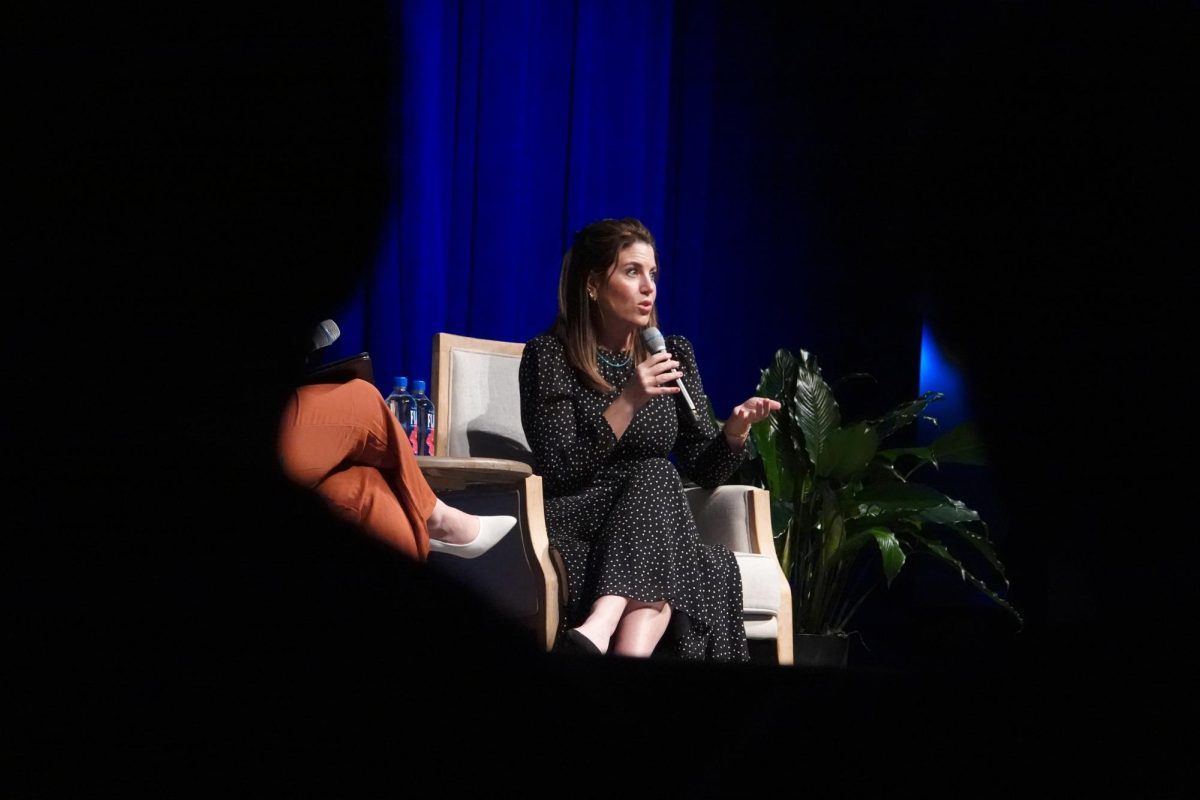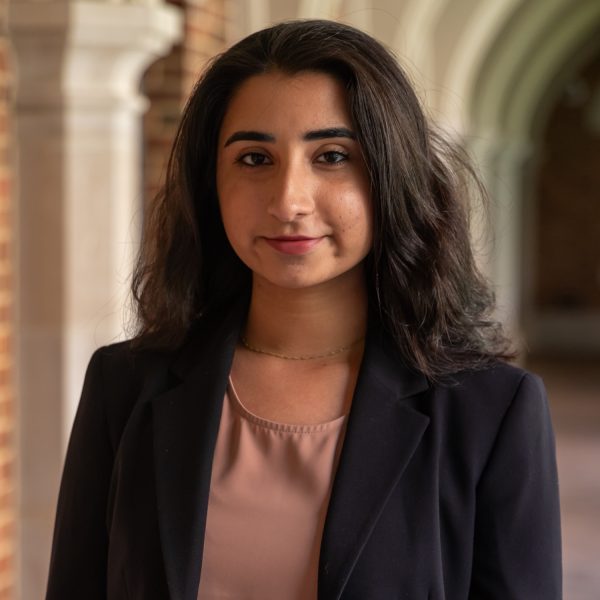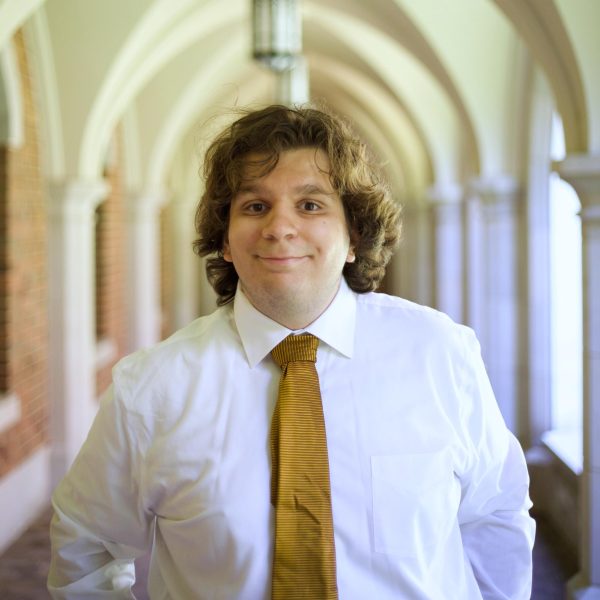Vanderbilt Student Government brought activist and public figure Monica Lewinsky to campus on April 10 to discuss public shaming, healing and anti-bullying advocacy. The discussion took place in Langford Auditorium and was moderated by incoming VSG Vice President Ellie Kearns, a junior, and Sarah Jordan Welch-Moore, an urgent care and trauma therapist at the University Counseling Center.
VSG’s event was co-sponsored by 31 campus departments, offices and student organizations including Project Safe, Women in Government and the Public Policy Studies Department. Kearns, who is currently the chair of VSG’s Sexual Assault Awareness and Prevention Committee, said she began coordinating the event’s funding logistics since May 2023.
“For so long, trauma survivors’ stories have been told for them,” Kearns wrote in a statement to The Hustler. “By giving [Lewinsky] the opportunity to share her experience in a way that felt authentic to her, I hope that Vanderbilt community members unlearned some of the problematic rhetoric that was so engrained in the story told on [Lewinsky’s] behalf.”
Following a decade of silence, Lewinsky authored an essay for Vanity Fair in 2014 that addressed her experience with public shaming as the center of former President Bill Clinton’s impeachment controversy. Now embracing her status as a public figure, Lewinsky is working to make social media a safer space through anti-bullying campaigns. Her most recent campaign integrates self-bullying into the conversation.
Lewinsky is also a producer on “Impeachment: American Crime Story,” as well as an executive producer on “15 Minutes of Shame.” Recently, she garnered attention for her partnership with the sustainable fashion brand Reformation in a campaign to promote voter participation.
Sharing her story
Welch-Moore opened the conversation by asking Lewinsky why she decided to share her story. Lewinsky described the “dark decade,” prior to her 2014 Vanity Fair essay, that led her to go public with her experiences.
“I had gone to graduate school, and the hope with that was to build a new scaffolding upon which I could have a new identity and get a job like a normal person and have a life like a normal person,” Lewinsky said. “It was incredibly naive of me to think that. I wasn’t able to get a job anywhere, and it led to a difficult time of not really having any purpose — which is challenging.”
Lewinsky said she began to look at the world differently in 2010 following Tyler Clementi’s death, which she said showed her how the internet and social media could exacerbate an individual’s humiliation. She said she also noticed an absence of dialogue on public shame.
“I think as a whole, we didn’t have a lot of stories or poster children for people who had been through a big public shaming and survived it and went on to thrive — in particular, women,” Lewinsky said.
Reflecting on the 10-year anniversary of her Vanity Fair essay, Lewinsky said it was the younger generation’s insistence that society reevaluate the events of 1998 that motivated her to share her story.
“It then became important to me to share my story because I started to see that it helped other people, so of course there are selfish reasons for doing it too, but I think that it was giving a purpose to my past and using this pain in in a way to help move the conversation around shame and trauma forward,” Lewinsky said.
Healing from the “dark decade”
Kearns asked Lewinsky to discuss the public scrutiny she faced as a subject of a significant political and legal controversy. Lewinsky, who was 24 years old at the time of the scandal, said the public’s reactions affected the way she perceived herself.
“Having been fat shamed and slut shamed and [experiencing] assumptions that the only things someone who looked like me could do [were] service someone… impacted my self esteem in really deep ways,” Lewinsky said.
Lewinsky said an important tool that helped her reclaim her voice and narrative was understanding that healing is not a linear journey. She said that going public was a necessary step for reclaiming her story and confronting her past.
“I think one of the biggest things I had to overcome in order to get to the place where I did to write that essay was to realize that, when I came out of graduate school and I worked, I had been trying to run away from what had happened to me and from who I was — and that ultimately, I was going to have to integrate everything that happened to me and who I was in order to move forward,” Lewinsky said.
Lewinsky said the support she received from family was another important resource for healing because she was prohibited from talking to friends for much of the investigation into the scandal. Her advice for others is to cultivate strong support networks.
“In a way, we live in this weird world where you now need to prepare a little bit for this idea of something happening, and where you’re preparing is in investing in your relationships because it’s the people who will keep you more to your true self that will help you stay,” Lewinsky said.
Kearns also asked Lewinsky to share how humor helped her heal. Lewinsky credited the physiological benefits of humor but also mentioned how humor helped her better connect with others.
“[Humor] just broke the tension,” Lewinsky said. “So, in that way, I think I also used it for many years of needing to make people feel comfortable and trying to help people over a speed bump because I’m very real, and I like real interactions.”
Have things changed?
Welch-Moore brought the conversation back to the present and asked Lewinsky whether the scandal would have gone down differently today given progressive shifts in societal attitudes and advancements in technology.
Referencing a post-Me Too world, Lewinsky discussed how power dynamics are now being considered in the conversation regarding consent. She views this as a positive development, framing it through her own experience.
“I’m always really mindful of being clear that what happened was not sexual assault, and I wanted to be there,” Lewinsky said. “But, there’s so many layers to this with the power dynamics; it forces a broader definition in question around consent.”
On the flipside, Lewinsky said she believes the evolution of social media would have made things more difficult for her, given the virality and extensive reach of content today.
“I would have seen so many more horrible memes and jokes, and I think that would have impacted my self esteem too,” Lewinsky said.
Sophomore Ella Goldman said Wednesday’s talk gave her a positive impression of Lewinsky.
“I did not have an opinion coming into this,” Goldman said. “It made me think of her in a positive light that she was able to turn a traumatic experience into professional growth. I loved her talk about therapy and rewriting self-narratives.”
When asked about what’s next for her professional journey, Lewinsky referenced her production work with 20th Television. She said they have a show in the works that sheds light on a story similar to her own.
“A few years ago, we started the process of working with Amanda Knox, optioning her memoir and developing a limited dramatic scripted series on her experiences as another young woman who was thrust onto the global stage and torn apart,” Lewinsky said.






